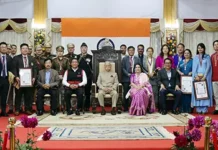Monday Musing
[ M Doley ]
In a move to promote freedom of choice and encourage women to wear what makes them feel comfortable, the women’s gymnastics team from Germany opted to wear full-body suits instead of the standard competition outfit at the Tokyo Olympics.
The move received praise from the global community.
In contrary to this, recently, a female candidate from Assam was not allowed to appear for an entrance examination for wearing shorts. She was forced to wrap a curtain around her legs before sitting for the examination. The incident took place at an examination centre in Assam’s Tezpur.
The incident stirred uproar among critics, activists and conscientious citizens from across the country. They said that it amounted to sexual harassment and was a reflection of a patriarchal society.
At the same time, the candidate received backlash on social media for not being cultured enough to know where to wear what.
The girl student stated that there was no mention about dress code in the admit card, and that she did not face such situation when she had appeared for the NEET entrance test a few days earlier, wearing the same dress.
Dress has nothing to do with examination. It is one’s own choice what to wear and what not. That said, there are also certain unwritten rules that we should follow according to the situation. A formal dress is always preferable for job interviews. We don’t turn up for such interviews wearing shorts, slippers or cargos, do we?
Look at our society. A priest always wears traditional dresses only while performing rituals. There are no written rules making it compulsory for us to wear traditional attires in our festivals; but still we wear them and nobody has to remind us about it. This is purely a matter of common sense.
During my school days, one day I was summoned to the headmaster’s room for wearing long pants, even though there was no prescribed dress code for students in our school at that time. The teachers did not allow the boy students to wear long pants up to Class 8 and only half-pants were allowed. For girl students of Class 8 and above, the uniform was mekhela chadar (a traditional Assamese dress worn by women). The headmaster did, however, let me go with a warning.
Wearing the right attire on the right occasion is most important. Dress plays a crucial role in enhancing the wearer’s personality. An individual is judged by what she/he wears and how they present themselves.



